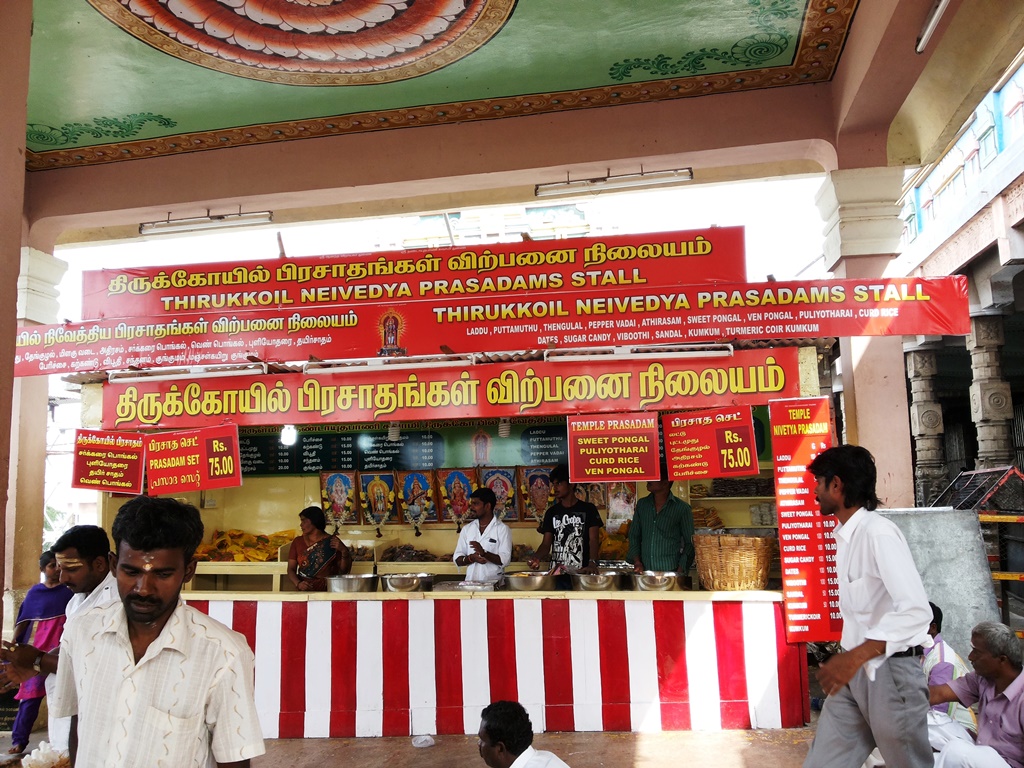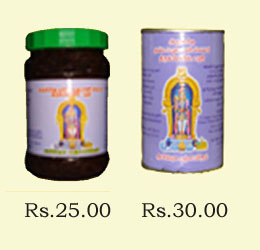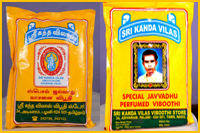Palani Prasadham's

Lord Muruga is Abhisekapriya (fond of anointment), especially Pañchamirta (fruit jam having medicinal properties). The Devasthanam prepares pañchamirta, vibhuti and other items which are sold for reasonable price. Like Pañchamirta, the Rakkala Sandanam (sandal paste placed on the deity during the night) has special significance and sanctity.
1. PANCHAMIRTHAM
2. VIBOOTHI
3. SANDHANAM
4. RAKKALA SANDHANAM
PANCHAMIRTHAM:

Palani Panchamirtam is the oldest form of jam or fruit mix and preserves very well, even for months. And the saying is that 'the olden it is, it tastes better'. The secret lies as much in the art of preparing it as in the quality of the fruit that is used as the basic ingredient. It is the small sized viruppachchi plantains which account for it, the reason being that they have very little water content. Incidentally, Viruppachchi is the name of a village (in the Palani Hills) where this particular variety of plantain is grown and marketed.
Crushed plantains apart, Panchamirtam consists of kandasari sugar from Kangeyam area, dates, kismis, sugar candy (kalkandu), cardamom and ghee in proper proportions: plantains 100 numbers; kandasani sugar 10 kgs.; dates 1 kg.; Sugar candy 500 giris.; kismis 500 giris.; ghee 250 giris.; cardamom 25 giris. The plantain is crushed fully. Sugar is then mixed with it. Seedless dates, sugar candy and kismis are added in the third stage. The last items to go into the preparation are cardamom and ghee.
Panchamirtam, collected after abhishekam, is not only a delicious and nourishing food; but also has astonishing properties which keep it in conditions suitable for consumption over a long period, without refrigeration. You are advised to buy all your requirements from the Devasthanam and to transfer the contents to your own containers for proper preservation. Interested persons may visit the Panchamirtam making kitchen in the Devasthanam's choultry. The Devasthanam has now made arrangements to manufacture Panchamirtam by using electric utensils.
VIBOOTH:

Vibhuti is a word that has several meanings in Hinduism. The word is found in other Indian languages in addition to Sanskrit. Vibhuti or Vibhooti refers to the paranormal powers that Patanjali claims that one can develop by the practices described in his book Yoga Sutras.
Vibhuti is also the name for ash used in religious worship in Hinduism. It is often made of burnt cow dung. The ash has several symbolic meanings. First of all, it is like in Catholicism a reminder of one's mortality. Secondly, it refers to the duty to get rid of one one's worldly desires that one should burn to ashes, just like Shiva burnt the god of desire, Kama, to ashes according to Hindu mythology. Thirdly if refers to God, because, ash, like God, can't be changed anymore.
SANDHANAM:
Sandhanam is also a religiously used paste and is known for its medicinal powers. Usually devotees apply sandhanam on their body, forehead, hands, and neck and over their head after shaving their hair.
RAKKALA SANDHANAM:
The idol is made of navapashanam.Navapashanam are Vellaipashanam, Kandhagam, and Kudhiraipal pashanam-Rasasendram, Pooram, Manosilai, Veeram, Poorama Lingam and Thallagam. These are believed to be the nine medicinal ingredients with which Saint Bogar made the idol of Murugan. During night the main deity is applied with sandhanam. The next day the sandhanam is taken off. It is then distributed to devotees. There is a great rush to get this santhanam; because it naturally gets the medicinal powers by remaining on the idol the whole night. This is known as the 'Raakala Sandhanam' and is believed to have curative powers. People believe if this sandhanam is taken/eaten continuously for one mandalam, that is forty eight days, it cures of all the diseases in the body and soul.





